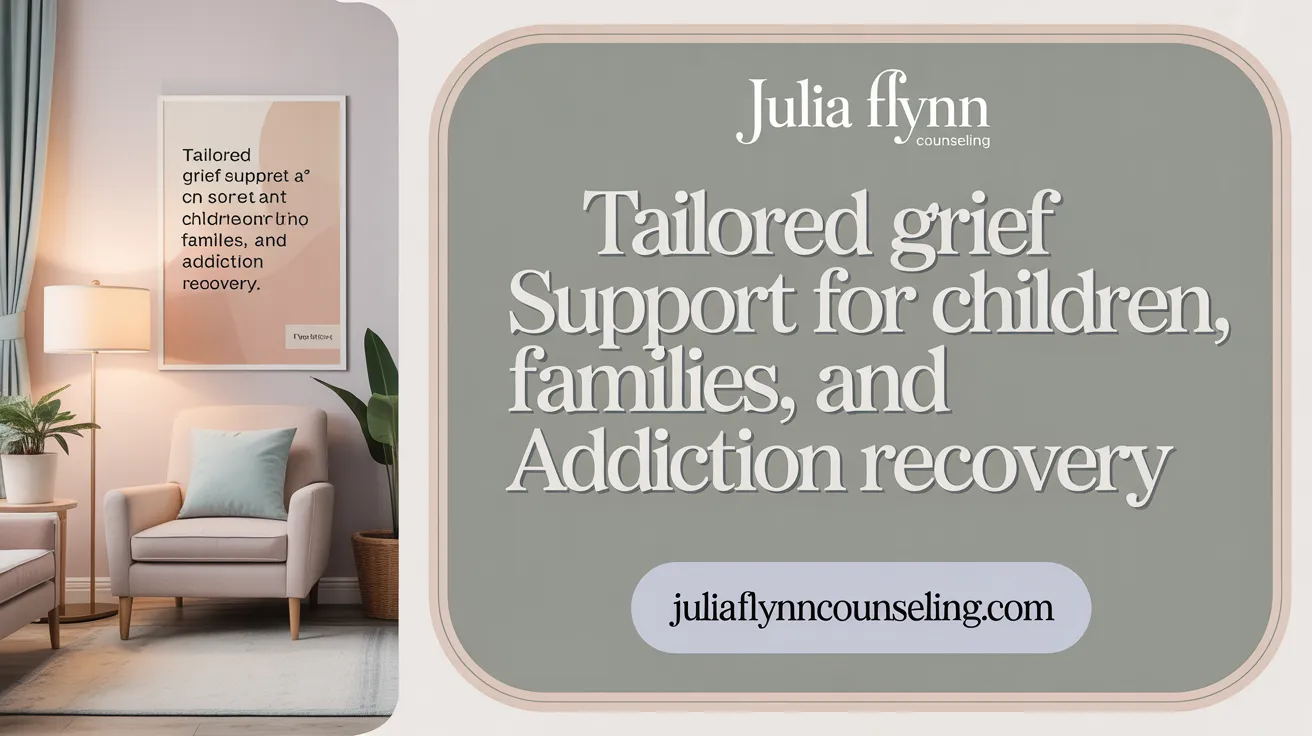Understanding Grief and the Need for Counseling
Grief is a profound, intensely personal response to loss that can significantly disrupt emotional and physical well-being. Recognizing when grief extends beyond natural mourning and when professional intervention is beneficial is crucial for healing. This article explores grief counseling as an essential pathway to managing loss, uncovering meaning, and rebuilding life after profound sorrow.
The Nature of Grief and Its Complex Journey
What is grief and how does it manifest in individuals?
Grief is a natural emotional response to loss that encompasses a broad spectrum of feelings such as sadness, anger, guilt, anxiety, and confusion. It is not limited to the death of a loved one but also arises from other significant losses like divorce, job loss, serious illness, or the end of a meaningful relationship. Physically, grief can manifest in fatigue, changes in appetite, sleep difficulties, headaches, and other body pains. This complex experience engages both the mind and body, creating a multifaceted response to the reality of change or loss (Understanding Grief Stages, Coping with Grief and Loss).
How does grief vary among individuals?
Each person's grief journey is unique, showing wide variations in its intensity, duration, and way of expression. Some people may experience traditional stages such as denial, anger, bargaining, depression, and acceptance, but not everyone follows this sequence, and some stages might be skipped or revisited unpredictably (Five Stages of Grief, Grief Stages Explained). Emotional symptoms may fluctuate and can include overwhelming sadness or moments of relief. Physical symptoms, like insomnia or exhaustion, can vary as well. For some, grief resolves gradually, but others may develop complicated grief—a prolonged and intense form that significantly impairs daily functioning and may require professional counseling or therapy (Complicated grief diagnosis, Grief counseling overview).
Understanding the physical and psychological symptoms associated with grief
Grief involves both emotional and physical symptoms. Emotional challenges include shock, disbelief, deep sadness, anger, anxiety, and guilt. Physically, individuals might experience changes in appetite, sleep disturbances, muscle aches, headaches, and fatigue, which are often linked to stress hormones released during grieving. Recognizing these symptoms as part of the grieving process can help normalize the experience and emphasize the importance of self-care and external support (Physical Symptoms of Grief, Emotional Symptoms of Grief, Self-care Tips for Grieving.
Common sources of grief beyond death
While the loss of a loved one commonly triggers grief, other life events can prompt similar emotional responses. These include divorce or separation, losing a job, miscarriage, retirement, loss of personal dreams or safety due to trauma, and even pet loss. Such varied sources highlight how grief is a response to any significant and impactful change or separation, not limited solely to bereavement (Common Sources of Grief, Understanding grief).
Distinguishing normal grief from complicated grief
Normal grief typically decreases in intensity over time and allows a person to gradually adapt to their new reality. Complicated grief, also known as prolonged grief disorder, occurs when grief remains severe and persistent beyond typical timeframes (often beyond six to twelve months). It involves intense yearning for the deceased, difficulty accepting the loss, emotional numbness, and social withdrawal, often requiring specialized psychotherapeutic treatment to aid recovery (Complicated Grief Therapy, Symptoms of complicated grief).
By understanding the complex nature of grief and its variability among individuals, those experiencing loss can be better supported in their healing journey, recognizing that grief is deeply personal and requires compassionate recognition and sometimes professional intervention (Grief Counseling Overview, Benefits of Grief Counseling).
Models and Stages of Grief: Frameworks for Understanding Loss

What are the stages of grief and how do they help individuals?
The well-known framework of grief stages was developed by Elisabeth Kübler-Ross and originally outlined five stages: denial, anger, bargaining, depression, and acceptance. These stages help individuals identify and make sense of their emotional experiences following loss. Denial acts as a protective buffer, allowing gradual acceptance. Anger provides an outlet for intense emotions, while bargaining reflects attempts to regain control through "what if" thinking. Depression often follows as the reality of loss settles, and acceptance marks the process of integrating the loss into one's life.
Expanded grief models including additional stages
Modern grief models have expanded upon Kübler-Ross’s original five stages. Additional stages such as shock, testing, and integration are recognized, emphasizing that grief does not follow a strict linear path. The concept of a "sixth stage" or the importance of finding meaning in loss has been increasingly recognized as a vital component of healing. Understanding this encourages individuals to discover purpose and personal growth amid grief, transforming pain into resilience.
Nonlinear, personal nature of grieving
It is important to acknowledge that grief is highly individual and nonlinear. People may experience stages out of order, revisit stages multiple times, or not experience some stages at all. The emotional journey varies in duration and intensity, and there is no fixed timeline for grieving. Recognizing this variability helps reduce self-judgment and supports personal acceptance of the grief process. For deeper insights into the personal nature of grief and the non-linear grief process, these resources offer valuable perspectives.
Importance of recognizing individual grief paths
Grief frameworks serve as guides rather than strict rules. They enable individuals to better understand their feelings, find validation, and access coping strategies tailored to their needs. Incorporating meaning-making into grieving fosters deeper healing, allowing individuals to rebuild their lives while honoring their losses. Appreciating individual grief paths highlights the need for compassionate, personalized support during the mourning journey. For more about understanding grief and finding meaning after loss, see these helpful resources.
The Role and Benefits of Grief Counseling in Healing

What is grief counseling and what are its goals?
Grief counseling is a specialized form of therapy aimed at helping individuals navigate the emotional complexity following a loss. Its main goals include helping individuals accept the reality of the loss, process painful emotions, adjust to new life circumstances without the deceased, and maintain a continued connection while moving forward. This process provides a compassionate and safe space to express grief that is deeply personal and unique for each individual. For a detailed overview of grief counseling techniques, visit this resource.
How does grief counseling aid in the healing process?
Grief counseling supports healing by offering empathetic listening, guidance, and tools to cope with loss. It reduces feelings of isolation by validating that grief responses are normal and diverse. Through counseling, individuals learn to build resilience, improve communication skills, and repair or strengthen relationships affected by grief. The therapy helps recognize when grief is prolonged or complicated and offers strategies to manage those challenges effectively. For insights on coping with grief and loss and recognizing intense grief, these resources can be helpful.
What are the benefits of grief counseling?
Key benefits include enhanced emotional processing and the development of healthier coping strategies such as journaling, mindfulness, and positive reframing. Clients often experience improved self-awareness, which helps identify negative thought patterns and replace these with adaptive behaviors. Counseling fosters acceptance of loss and assists individuals in regaining control over their emotions, reducing anxiety and stress associated with grief. Learn more about benefits of grief counseling and coping strategies for grief.
How is grief counseling different from grief therapy?
While grief counseling typically addresses normal grief and helps individuals adapt healthily, grief therapy targets complex or prolonged grief reactions such as complicated grief disorder. Therapy often involves more intensive techniques to resolve persistent distress and impairment. Explore the distinctions and effective grief therapy techniques and complicated grief treatment for more information.
How does grief counseling impact mental and physical health?
Grief counseling can mitigate risks of mental health conditions linked to grief, including depression, anxiety, and post-traumatic stress disorder. It also plays a role in reducing the physical health consequences of grief, such as fatigue and immune system weakening, by promoting self-care and emotional regulation. Overall, counseling supports holistic recovery by bridging emotional, mental, and physical well-being. For data on mental health and substance use alongside grief support, visit SAMHSA behavioral health resources.
Effective Techniques and Interventions in Grief Counseling
What techniques are used in grief counseling to support healing?
Grief counseling employs many methods to support individuals through their loss. Active listening and empathy form the foundation, allowing counselors to validate emotions and provide a safe space for expression (grief counseling techniques, grief counseling).
Cognitive Behavioral Therapy (CBT) is widely used to identify and reframe negative thought patterns that may complicate grief (CBT for grief, Cognitive Behavioral Therapy for grief). Meanwhile, Acceptance and Commitment Therapy (ACT) encourages embracing difficult emotions and focusing on personal values and mindfulness to foster acceptance (Acceptance and Commitment Therapy, mindfulness in grief counseling).
Creative interventions such as letter writing to the deceased, imagery exercises, and role-playing offer clients ways to externalize and process complex feelings (letter writing for grief therapy, imagery techniques in grief counseling, role-play in grief therapy. Rituals, including creating memory books and commemorative activities, help maintain connections while supporting healing (grief rituals and healing, memory books for grief.
Group counseling and online support provide communal spaces where individuals share experiences and gain mutual encouragement (online grief support resources, support group discussions). These formats also enhance access for those unable to attend in person (in person or online grief meetings.
Assessment tools like the Hogan Grief Reaction Checklist help professionals tailor interventions by evaluating grief severity and progression (Hogan Grief Reaction Checklist.
These combined techniques form a holistic approach, addressing the emotional, cognitive, and social dimensions of grief to promote healthy adaptation and resilience (techniques and interventions for grief counseling.
Recognizing When Grief Counseling is Needed

How can one recognize when grief counseling is necessary?
Grief counseling becomes essential when grief symptoms extend beyond typical emotional reactions and begin to interfere significantly with daily life. Signs that professional support may be needed include persistent sadness, insomnia, loss of appetite, and withdrawal from social interactions. Other critical indicators are intense and uncontrollable emotions such as anger or guilt, frequent crying, panic attacks, or thoughts of suicide (13 Signs You Should Seek Grief Counseling).
Prolonged or complicated grief involves difficulties accepting the loss, intrusive thoughts about the circumstances of death, substance abuse, and the inability to carry out everyday responsibilities. When grief symptoms persist longer than six months to a year without improvement, or when these signs severely disrupt functioning, seeking counseling is strongly advised (Complicated Grief Diagnosis and Treatment).
Importance of timely counseling
Early intervention in grief counseling can prevent the development of prolonged grief disorder and other mental health issues such as depression or anxiety. Timely counseling helps individuals process their emotions, develop coping strategies, and adapt to life changes more effectively. It also reduces feelings of isolation by providing validation and connection through safe, supportive environments (Benefits of Grief Counseling.
Resources and support options available
Support is available via in-person therapy, group counseling, online platforms, and helplines tailored to grief and bereavement. Support groups offer peer connection facilitated by trained professionals, while online options provide accessibility for those with mobility challenges or in remote areas (GriefShare support group program, SAMHSA behavioral health resources).
Criteria for choosing counselors or support groups
When selecting a grief counselor or support group, verifying credentials and experience in bereavement care is crucial. Participants should feel comfortable and safe, with the freedom to change providers if the fit is not right. Counseling that integrates evidence-based therapies such as Cognitive Behavioral Therapy (CBT) or Acceptance and Commitment Therapy (ACT) can offer more effective outcomes (Grief Counseling Techniques and Interventions, Therapy for Grief).
Finding grief counseling support early and recognizing the signs that professional help is needed can guide individuals through healing and foster long-term emotional resilience.
Specialized Grief Counseling: Children, Families, and Addiction Recovery

What specialized grief counseling approaches exist for different populations?
Grief counseling adapts its methods to meet the unique needs of varied populations. For children, counselors use age-appropriate techniques such as concrete language, storytelling, and play therapy to help them understand and express their feelings. This approach acknowledges children's developmental levels and provides safe spaces to process grief (Grief counseling techniques, Grief counseling for children.
Family grief counseling focuses on creating a supportive setting where members can share emotions collectively. It helps families recognize individual grieving styles, fostering healthier communication and mutual support. This process often involves professional facilitators guiding families through emotional expression and conflict resolution strategies, strengthening family bonds during difficult times (Family grief counseling, Family grief counseling approaches.
For individuals recovering from addiction, grief counseling plays a crucial role in addressing unresolved loss, which can be a trigger for substance use. Integrating grief support within addiction recovery helps prevent relapse by tackling underlying emotional pain. Approaches often include mindfulness, individual and group therapy, and expressive techniques tailored to promote holistic healing of mind, body, and spirit (Grief counseling in addiction recovery).
Importance of cultural and developmental considerations
Effective grief counseling recognizes cultural backgrounds and developmental stages, tailoring interventions accordingly. This cultural sensitivity ensures respect for diverse mourning rituals and beliefs, enhancing engagement and trust. Addressing developmental needs, from childhood through adulthood, allows therapists to apply appropriate communication styles and therapeutic tools, improving outcomes (Grief counseling benefits, Culturally sensitive grief counseling.
Integrative therapies for complex grief situations
In complex grief cases, counseling may involve a combination of therapies such as Cognitive Behavioral Therapy (CBT), Acceptance and Commitment Therapy (ACT), and narrative or art therapy. These integrative methods help individuals process emotions, restructure thoughts, and find personal meaning. Such tailored interventions are particularly beneficial in complicated or prolonged grief, supporting adaptive adjustment and healing (Complicated grief treatment and therapy, Grief therapy techniques, Integrative grief counseling approaches.
Community and Support Programs: Extending the Reach of Grief Support

How do community programs like GriefShare support group program support individuals coping with loss?
Community programs such as GriefShare play a vital role in aiding individuals through their grief journeys. GriefShare offers a well-structured 13-week grief support groups cycle of support groups where participants engage in weekly 30-minute grief videos featuring grief experts and personal stories, participate in support group discussions, and complete personal workbook for grief exercises. These groups address common emotional challenges including loneliness, fear, anger, and regrets, facilitating healing through shared experiences. GriefShare supports flexibility by allowing people to join GriefShare anytime at any point in the cycle and offers sessions both in person or online grief meetings, making it accessible worldwide. Over one million people have benefited from GriefShare, highlighting its broad impact.
What is the effectiveness of community-based bereavement counseling?
Community-based bereavement counseling, often delivered by trained volunteers, supplements professional mental health services and has proven long-term benefits. Studies indicate these programs can significantly reduce symptoms of complicated grief, especially when started at least six months after bereavement. By combining elements from cognitive-behavioral therapy in grief support, person-centered counseling, and psychodynamic approaches, these community interventions support individuals in managing grief progressively, with improvements often more evident after counseling concludes.
How do support groups and online platforms expand grief support?
Support groups in the community, alongside accessible online grief support resources, create safe spaces where individuals can express their emotions and feel validated. Online grief support forums and virtual counseling have become increasingly relevant, especially during periods requiring social distancing. These platforms broaden access to grief resources and provide ongoing peer support that alleviates isolation.
What are the long-term benefits of peer support?
Peer support fosters understanding and connection, which are crucial in navigating grief. Being part of a community reduces feelings of loneliness and normalizes complex emotions. Over time, shared support contributes to resilience, better coping strategies, and the rebuilding of social bonds that might be strained due to grief.
How do community grief programs integrate faith-based and psychological frameworks?
Programs like GriefShare blend faith-based grief counseling with evidence-based psychological principles, offering a holistic approach to grief. While operating as a ministry affiliated with Church Initiative, GriefShare maintains an inclusive environment inviting participants from diverse backgrounds. This integration respects spiritual needs while emphasizing psychological coping techniques such as normalization of grief, emotional processing, and healing through community connection.
Through flexible, accessible, and comprehensive frameworks, community and support programs significantly extend the reach of grief care, providing individuals with both education and empathetic connection that foster healing after loss.
Finding Meaning and Acceptance: The Transformative Power of Grief Counseling
How does grief counseling facilitate finding meaning and acceptance after loss?
Grief counseling plays a vital role in helping individuals move from the depths of grief toward a place of acceptance. This transformation begins with encouraging clients to openly process their emotions and embrace mindfulness—being present with their feelings without judgment. Therapists guide clients toward forgiveness, including forgiving themselves and others, which eases emotional burdens and opens pathways to healing (Healing After Loss).
Drawing from Viktor Frankl's philosophy, grief counseling helps individuals find meaning within their suffering. Counselors assist clients in reframing their loss as a passage to personal growth rather than just pain. This reorientation nurtures the internal creation of purpose, allowing clients to integrate grief as a meaningful chapter of life (From Grief to Acceptance.
Moreover, grief therapy encourages exploring new purposes after loss, such as engaging in acts of kindness, volunteering, or creative endeavors. These activities foster renewal and provide healthy ways to honor memories. Practicing gratitude helps shift focus toward remaining blessings, promoting emotional resilience (Finding Meaning After Loss).
Ultimately, this healing journey from grief to acceptance is unique to each person. Therapeutic support offers a compassionate, structured environment where individuals can safely navigate this process. Trained professionals help facilitate reflection, emotional expression, and the discovery of renewed hope and meaning, supporting lasting personal growth after loss (Healing After Loss.
Embracing the Path of Healing Through Grief Counseling
Grief counseling is a vital resource that offers comfort, guidance, and tools for navigating the complex emotional landscape after loss. By recognizing the unique nature of grief and incorporating tailored therapeutic techniques, individuals can find a path toward acceptance, renewed purpose, and emotional resilience. Whether through individual therapy, family support, or community programs, grief counseling fosters healing and the rebuilding of life meaningfully connected to those we have lost.
